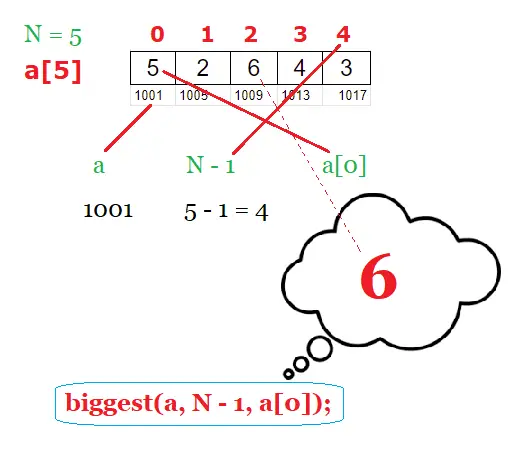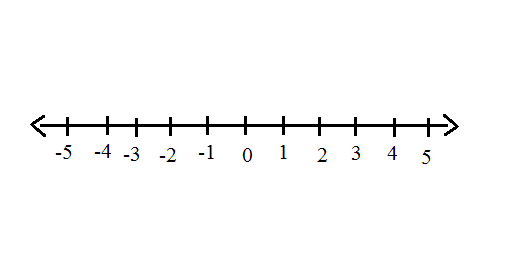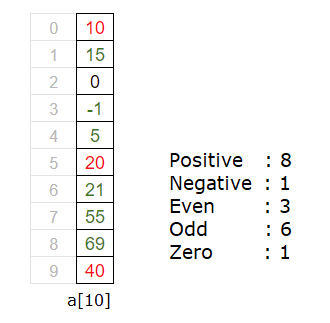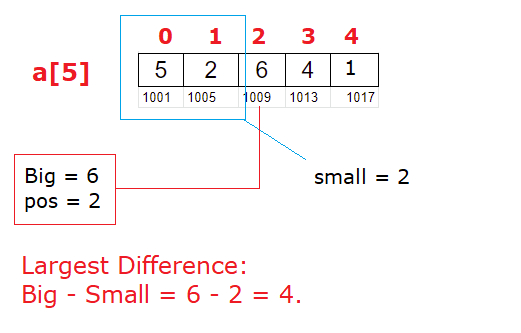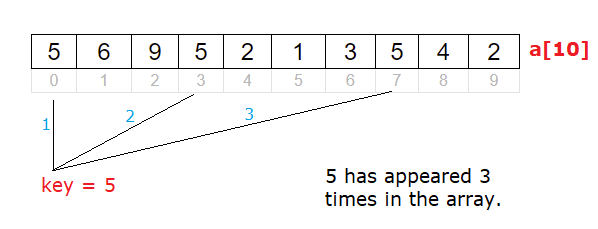Write a C program to find smallest element / number in an array using pointers and recursion.
We have covered both these logic in this video tutorial
1. Recursive function with no return type.
2. Recursive function with return type.
Related Read:
C Program To Find Smallest Element In An Array
Recursive Functions In C Programming Language
Basics of Pointers In C Programming Language
Introduction To Arrays: C Programming Language
Important Video Tutorial
C Programming: Arrays, Pointers and Functions
Example: Expected Output
Enter 5 integer numbers
5
2
6
4
3
Smallest Element In The Array: 2
Visual Representation
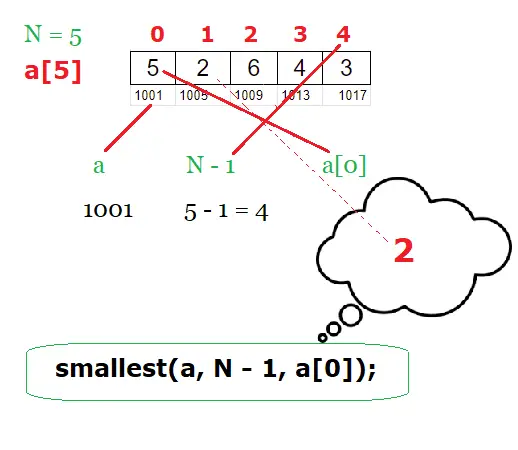
Video Tutorial: C Program To Find Smallest Element in An Array using Recursion
[youtube https://www.youtube.com/watch?v=sGGxml1TCBI]
Source Code: C Program To Find Smallest Element in An Array using Recursion
Method 1: With No Return Type
#include<stdio.h>
#define N 5
void smallest(int *num, int n, int small)
{
if(n < 0)
printf("Smallest Element In The Array: %d\n", small);
else
{
if(small > *num)
small = *num;
smallest(++num, --n, small);
}
}
int main()
{
int a[N], i;
printf("Enter %d integer numbers\n", N);
for(i = 0; i < N; i++)
scanf("%d", &a[i]);
smallest(a, N - 1, a[0]);
return 0;
}
Output:
Enter 5 integer numbers
2
1
3
4
5
Smallest Element In The Array: 1
Logic To Find Smallest Element In An Array using Recursion
We ask the user to enter N integer numbers and store it inside array variable a[N]. We pass base address(address of first element in the array) of the array, which is present in &a[0] or a, and last index of the array(indicating size of the array, from index 0), and first element of the array(assuming first element itself as smallest element).
Inside Recursive function
Base Condition: This is the condition to terminate the recursive call. Here we check if the size of the array is less than zero. If it’s less than zero, then we display the value present inside variable small, which holds the smallest element in the array.
void smallest(int *num, int n, int small)
{
if(n < 0)
printf("Smallest Element In The Array: %d\n", small);
else
{
if(small > *num)
small = *num;
smallest(++num, --n, small);
}
}
We need to take a pointer variable to accept the base address. Next we’ll have base condition. If base condition isn’t met – we check if the value present in variable small is greater than value present at *num. If it’s true, then we transfer the value of *num to small. Next we increment the address of num by 1 and decrement the value of n by 1 and pass them to the same function(recursive call) along with the value of small. This is called recursive function call.
Once value of n is less than 0, we display the value of variable small, which holds the smallest element of the array.
Important Note:
1. Array elements are always stored in contiguous memory location.
2. A pointer when incremented always points to an immediately next location of its own type.
Source Code: Find Smallest Element of An Array using Recursion: With Return Value
Method 2: With Return Type
#include<stdio.h>
#define N 5
int smallest(int num[], int n, int small)
{
if(n < 1)
return small;
else
{
if(num[n] < small)
small = num[n];
return smallest(num, --n, small);
}
}
int main()
{
int a[N], i;
printf("Enter %d integer numbers\n", N);
for(i = 0; i < N; i++)
scanf("%d", &a[i]);
printf("Smallest Element In The Array: %d\n", smallest(a, N - 1, a[0]));
return 0;
}
Output:
Enter 5 integer numbers
2
1
0
3
5
Smallest Element In The Array: 0
After repeatedly incrementing value of num and decrementing the value n, we’ll reach a point where value of n will be less than 0. That’s when all the comparisons end, and variable small will have smallest element of the array. This result will be returned to the calling function, which in turn returns the result to the calling function and so on ..until the result is returned to the first function call, which was from with in main method – where we print the value of variable small.
Source Code: Using Array Variable In Recursive Function
Find Smallest Element of An Array using Recursion
#include<stdio.h>
#define N 5
void smallest(int num[], int n, int small)
{
if(n < 0)
printf("Smallest Element In The Array: %d\n", small);
else
{
if(small > num[n])
small = num[n];
smallest(num, --n, small);
}
}
int main()
{
int a[N], i;
printf("Enter %d integer numbers\n", N);
for(i = 0; i < N; i++)
scanf("%d", &a[i]);
smallest(a, N - 1, a[0]);
return 0;
}
Output:
Enter 5 integer numbers
1
0
2
-5
4
Smallest Element In The Array: -5
Here we are taking array variable to receive the base address. We keep checking if num[n] is smaller than value present at variable small. If true, then we transfer num[n] value to variable small, and then recursively call the same function by decrementing the value of n by 1, and also pass the new value of small.
Once the value of n is less than 0, we return the value present in variable small, which holds the smallest element of the array.
Explanation With Example
N = 5;
a[N] = {5, 2, 6, 4, 3};
n = N – 1 = 5 – 1 = 4;
num = a[0] = 5;
big = a[0] = 5;
smallest(num, --n, small);
| n | num[n] | small |
|---|---|---|
| 4 | 3 | 3 |
| 3 | 4 | 3 |
| 2 | 6 | 3 |
| 1 | 2 | 2 |
| 0 | 5 | 2 |
| -1 | 2 |
Smallest Element in the array: 2
For list of all c programming interviews / viva question and answers visit: C Programming Interview / Viva Q&A List
For full C programming language free video tutorial list visit:C Programming: Beginner To Advance To Expert
